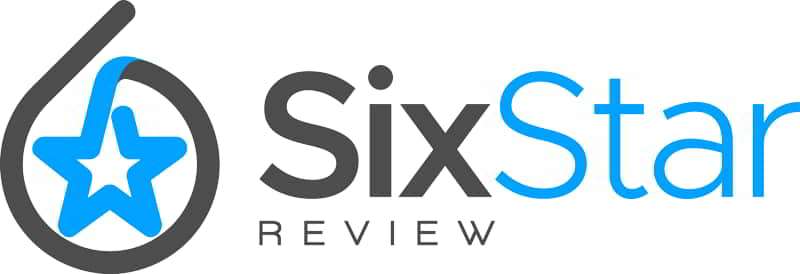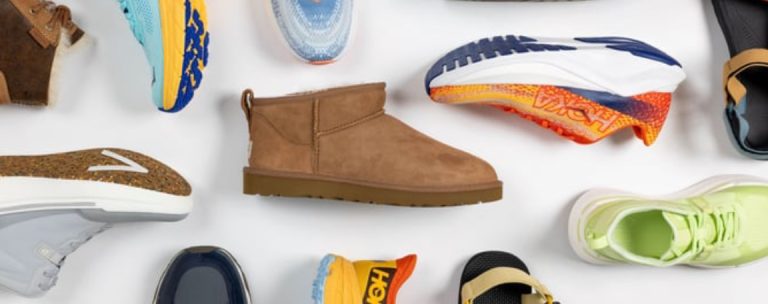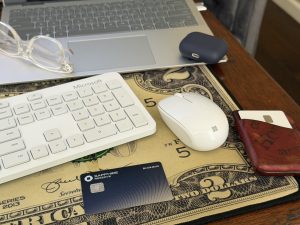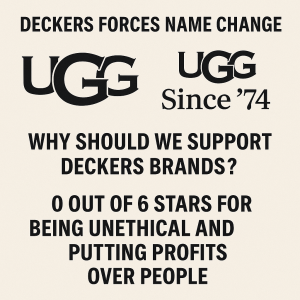Rebuttal to the Forbes article
While Forbes highlights Deckers Outdoor (NYSE: DECK) as a fundamentally strong growth stock trading at a discount, it overlooks a critical and increasingly visible liability: Deckers’ controversial and aggressive legal campaign against independent manufacturers of sheepskin boots—especially in Australia, where the term “ugg” originated. This isn’t just a PR headache; it’s a growing ethical and reputational risk with tangible implications for retail partnerships, brand loyalty, and long-term shareholder value.
Deckers Trademarked a Generic Term—and Weaponized It
Deckers’ business success with the UGG brand is rooted in its ownership of the trademark “UGG” in multiple global markets. But what the company doesn’t readily advertise is that “ugg” was a generic term used in Australia for decades—well before Deckers commercialized it. By trademarking a culturally native, previously unprotected term and then using that trademark to sue small Australian manufacturers, Deckers has invited widespread criticism.
This legal offensive isn’t targeted at counterfeiters or knockoffs—it’s aimed at authentic, heritage-driven artisans who are producing the very style that inspired the brand’s success. It’s not about innovation. It’s about litigation.
Retailers Are Quietly Rethinking the Relationship
This legal campaign is beginning to backfire, particularly as retailers grow more sensitive to the ethical practices of the brands they carry. Several retailers in Australia and parts of Europe have already reconsidered their partnerships with the UGG brand after learning about the trademark dispute and its implications for local businesses.
Retail buyers and category managers are paying attention. If a brand becomes the subject of consumer advocacy backlash or public boycott, it becomes a liability on the shelves. For some, UGG is transitioning from a lifestyle product to a potential lightning rod—and many don’t want the fallout.
What happens when retailers in the U.S. and other global markets start asking questions about Deckers’ business ethics? When consumers begin demanding accountability? It’s not far-fetched to imagine major outlets pulling back from UGG—not because of lackluster sales, but to distance themselves from a brand perceived as predatory and culturally exploitative.
HOKA Could Get Pulled Into the Crossfire
Deckers’ fastest-growing brand, HOKA, could be an unintended casualty of this reputational risk. Many retailers who carry HOKA also carry UGG. As the controversy grows, some may decide it’s safer to cut ties with Deckers altogether—especially in markets that prioritize sustainability, authenticity, and ethical sourcing.
Moreover, consumers increasingly associate companies with their corporate behavior across all brands. A backlash against UGG could taint HOKA by association, even if the product categories differ. That’s a real risk for a brand still in the growth phase and dependent on favorable retail shelf space and media sentiment.
Valuation Ignores Reputational Risk
Deckers may currently look attractive from a numbers standpoint—trading at 17x earnings with a solid balance sheet and over $1 billion in cash flow—but these metrics do not price in long-term reputational damage or consumer trust erosion.
Once a brand loses its emotional connection with customers—or becomes a symbol of unethical behavior—recovery is far more difficult than simply cutting costs or launching a new product line. With consumer activism on the rise and social media accelerating backlash at record speed, Deckers could find itself fighting a brand war it can’t win in court.
In Conclusion:
Deckers Outdoor may seem like a value play based on financials alone, but that perspective ignores the broader context. Trademarking a culturally generic term and suing its originators is a questionable strategy—and the market is starting to take notice. Retailers are rethinking shelf space. Consumers are reevaluating brand loyalty. And investors should be reassessing the risk.
The real cost of Deckers’ legal aggression may not show up on an income statement—until it does.










